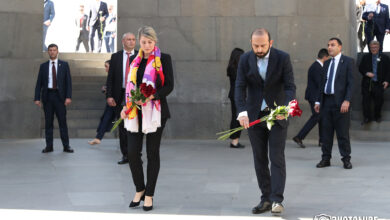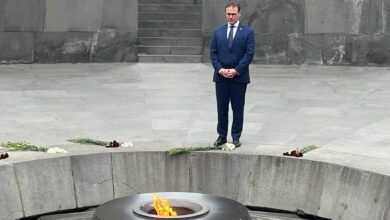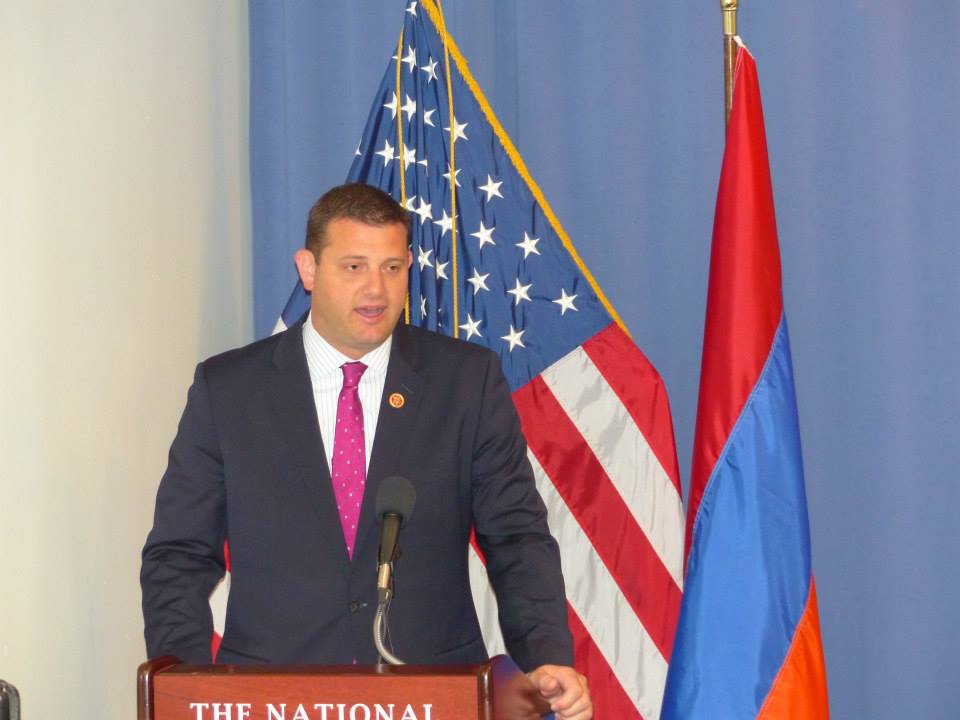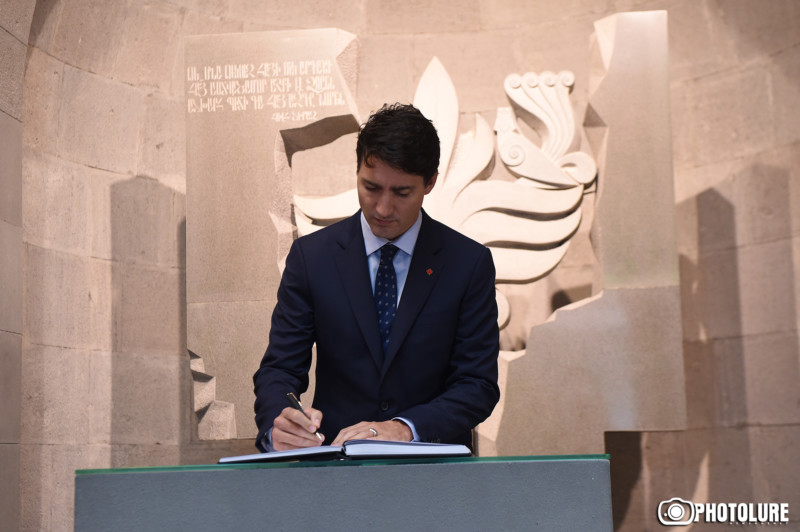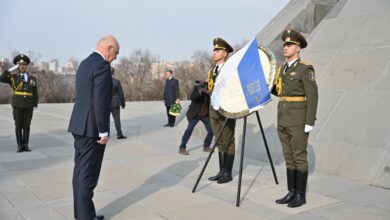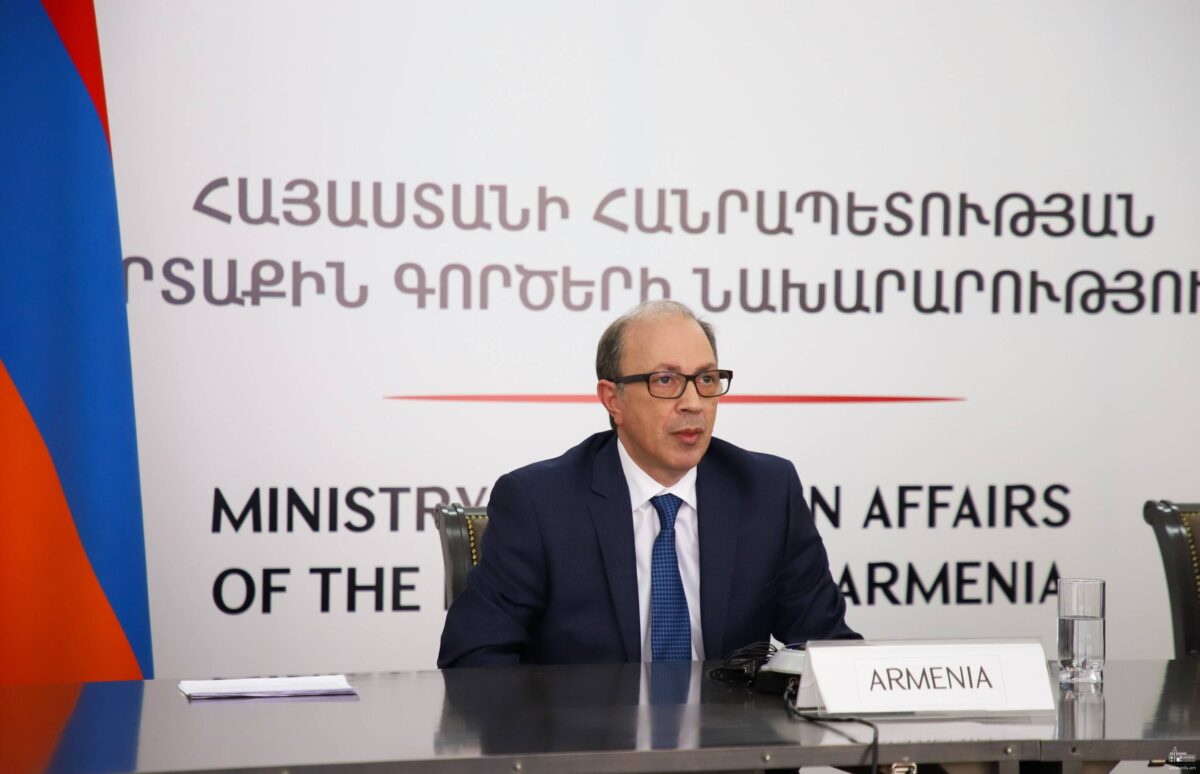
Armenia has assumed the chairmanship of the OSCE Forum for Security Co-operation for the second time in 17 years.
“Today, Armenia assumes the Chairmanship of the Forum when the security, peace, and stability in the OSCE area is being challenged like never before due to several factors,” Foreign Minister Ara Aivazian said in his opening remarks.
“Firstly, the security map of Europe had always covered wider geography than Europe itself and this logic is embedded in the OSCE extending from Vancouver to Vladivostok. After 46 years of establishing geography of the European security, we have to acknowledge that its current map does not entirely reflect the realities. New threats to the European security emerged particularly from the South – Mediterranean and Middle East regions. These threats especially the phenomenon of the foreign terrorist fighters have been on the radar of our Organization since 2014. However, too little was done to create effective capacities to counter these security risks. As a result, in 2020 we had the first case of massive use of foreign terrorist fighters from Syria and Libya in the OSCE area amid complete inaction of our Organization,” Minister Aivazian said.
“Inability to sustain indivisibility of the European security has been reflected in its mapping as well. The OSCE area seems to be fragmented into the core and periphery of the European security. This phenomenon is well observed in the disproportional attention towards different conflict and crisis situations in the OSCE area,” he added.
Secondly, he said, the OSCE mechanisms designed to strengthen security have been questioned due to the growing disagreements on essential arms control regimes and CSBMs. “And here I am primarily referring to those who formally remain in those regimes and undermine their credibility by systematically, intentionally and massively violating them for many years. As a result, the integrity of the arms control regime had been seriously damaged which allowed certain participating States to create capacities for war.”
“Thirdly, the global decline and erosion of multilateralism, which did not bypass the OSCE, is reflected here by clear shortcomings to utilize early warning and conflict prevention toolbox,” the Foreign Minister stated.
Last but not least, he said, the very idea of the Security and Co-operation in Europe whether within Conference or Organization has been inadmissibility of war and use of force.
“The Helsinki Final Act revealed the determination of the participating States to cooperate and engage in an inclusive dialogue with the aim to reduce the risks of war, inter alia by seeking mutually agreed ways to resolve the disputes peacefully even in the event of failure to reach a solution,” Aivazian stated.
“It was 46 years ago. Last year the massive use of force by Azerbaijan with direct involvement of Turkey and its supported foreign terrorist fighters took 44 days and led to thousands of casualties, war crimes and ethnic cleansing, tens of thousands of displaced in Nagorno-Karabakh,” he added.
The Armenian Foreign Minister noted that Azerbaijan has not been merely justifying the use of force but claiming that through the force it resolved the conflict and created new realities on the ground. “Realities created by the use of force cannot be legitimate as they generate environment conducive to war in each and every conflict and crisis situation.”
He stressed that the mere fact that the use of force occurred within the conflict addressed by the OSCE clearly indicates that the Organization has not been able to defend its key values, principles and commitments.
“Thus, the relevance of the OSCE as a regional arrangement under Chapter VIII of the Charter of the United Nations and as a primary organization for the peaceful settlement of disputes within its region, has been questioned,” the Foreign Minister stated.
“Apparently, our Organization today does not meet requirements set up by the Helsinki Final Act. It failed to prevent, undertake early actions or respond to conflicts particularly through the work of executive structures. The successful conflict related missions are exception rather than rule and we risk to turn the OSCE into a single conflict related arrangement,” he noted.
In a situation when a large portion of the OSCE commitments particularly those related to the politico-military dimension is not implemented, the Foreign Minister stressed the need to reassess the role of the executive structures initially designed for assisting participating states to implement those commitments.
“The genuine dialogue among participating states on the implementation of the OSCE commitments should be our first priority. In our view, we need to be driven by the spirit of dialogue which prevailed in Helsinki and led to the establishment of the Conference on Security and Cooperation in Europe,” he said.
“The current security environment in the OSCE area requires joint efforts, commitment, and political will to uphold the OSCE concept of comprehensive, indivisible and cooperative security. The programme of the Armenian Chairmanship derives from the urgent need to protect the OSCE principles and commitments to prevent further erosion of the OSCE security environment. Armenia is committed to lead these efforts during the second trimester of the FSC Chairmanship under the motto of “Rebuilding trust and confidence through implementation of the Politico-Military Commitments”.” Minister Aivazian said.
The Armenian Chairmanship will launch a Security Dialogue on the compliance with international humanitarian law which will provide an opportunity for the participating States to reaffirm their commitment to the principles of international humanitarian law as embodied in the OSCE Code of Conduct on Politico-Military Aspects of Security.
“We believe that the OSCE as the largest regional security organization should be resolute in protecting its principles and combating terrorism particularly the phenomenon of foreign terrorist fighters. It requires consolidated and comprehensive efforts and a cross-dimensional approach given the nature of the threat. The role of the OSCE in combating terrorism in all its forms and implementation of the existing commitments will be at the focus of a joint FSC-PC meeting,” the Foreign Ministry said.
“Arms control and disarmament issues have always been in the center of the OSCE’s activities as they are key in ensuring security and stability. Since the early 1990s, the OSCE has gone beyond a modest set of confidence-building measures introduced by the Helsinki Final Act and developed the conventional arms control regime in Europe which is considered as the cornerstone of European security. The CFE Treaty, Vienna Document on Confidence- and Security-Building Measures, Open Skies Treaty, and other confidence- and norm-setting measures have for years proved their effectiveness in enhancing military transparency and predictability. Yet it is unequivocally clear that today we are experiencing a crisis in this field as many participating states believe that those regimes no longer serve their interests,” he added.
“Thus, we need to stand back and assess the very foundation of the comprehensive and cooperative security upon which all arms control regimes were hinged. Without clear commitments of all participating states to non-use of force and collective efforts to prevent use of force everywhere in the OSCE area, the efficiency of legally and politically binding mechanisms will be elusive,” the Minister stressed.
With this in mind, the Armenian FSC Chairmanship will initiate a number of Security Dialogues dedicated to arms control and confidence-and security-building measures, new generation warfare, military exercises, small arms and light weapons, and UN Security Council Resolution 1540 enabling the participating States to engage in dialogue on the future of these measures and their role and relevance in enhancing European security.
“The evolving security threats require coordination of efforts and cooperation among relevant organizations. Similar activity areas of the OSCE and CSTO establish a solid foundation for interaction between the two organizations. The Security Dialogue of the Armenian Chairmanship on regional security arrangements will be aimed at discussing the role of the CSTO in enhancing regional security and addressing the contemporary security challenges and threats, and the perspectives of strengthening cooperation between the OSCE and CSTO towards a common and indivisible Euro-Atlantic and Eurasian security community,” Minister Aivazian added.
“Peace is not sustainable without protection and promotion of human rights, including human rights of women. “Women, peace and security” is among our priorities and will remain high on the agenda of the Armenian FSC Chairmanship. Armenia firmly believes that women have a key role to play in all stages of conflict cycle and peace is more sustainable with full, equal and meaningful participation of women,” he noted.


